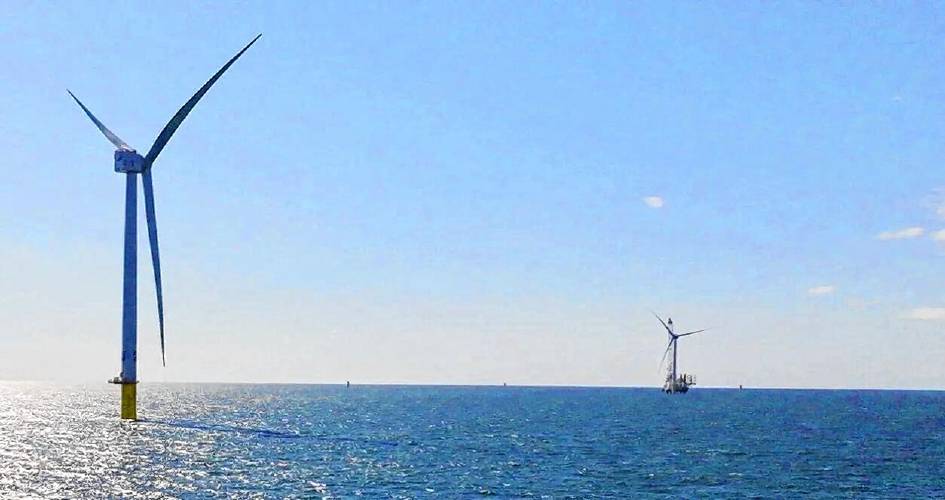Clean energy lobby says it’s ‘get serious’ time; state not on track to meet 2030 goals

Wind turbines with the Vineyard Wind project stand in waters south of Martha's Vineyard. Vineyard Wind/Worldview Films
| Published: 12-21-2023 4:21 PM |
BOSTON — Massachusetts will fail to hit a major emissions reduction requirement in 2030 unless Beacon Hill passes significant legislation to accelerate progress, leaders of a top advocacy group warned Wednesday.
As plans begin to take shape for the next debate on wide-ranging climate and clean energy bills, the Environmental League of Massachusetts issued a year-end call to action, urging lawmakers to focus on electrifying the transportation sector, streamlining project siting and permitting, and boosting the offshore wind industry that has been slow to take shape here.
The Healey administration projects Massachusetts will hit a target of reducing greenhouse gas emissions 33% below 1990 baselines by 2025, and the immediate milestones past that date are substantially higher. By 2030, Massachusetts is targeting a 50% reduction — a goal that ELM Vice President of Policy Amy Boyd Rabin said is at risk without redoubled effort from state government.
“Massachusetts is not on track to meet our 2030 goals of 50 percent emissions reductions,” Boyd Rabin said. “Massachusetts needs to be at an inflection point. We need significant shifts in all of the sectors, and we need all of the decisions that we are making as consumers or at the government level to head in the same direction, and that is to push emissions sharply down. So it is time to get really serious.”
Top Democrats have begun to signal plans to take up another wide-ranging omnibus climate and clean energy bill next year. David Melly, ELM’s legislative director, said he expects at least one chamber’s proposal for an omnibus bill to emerge this winter, before the Feb. 7, 2024 deadline for legislative committees to advance, hold or spike proposals.
“Frankly, we can’t afford to let a legislative session go by without passing major climate legislation,” Melly said. “A big part of why we are on track to meet our 2025 emissions reduction goals is because we’ve made this incremental progress over the last several years towards those goals in all sectors of our economy, but we’re never going to get to our 2030 goals or beyond if we don’t keep the drumbeat up.”
While the state is making progress on embracing clean energy, offshore wind and hydropower projects have stalled or stumbled, there has not been widespread adoption by consumers of solar energy, electric vehicles and cleaner home heating and air conditioning.
The transportation sector accounts for 37% of greenhouse gas emissions in Massachusetts, the most of any individual area, according to state data.
Article continues after...
Yesterday's Most Read Articles
“Transportation is an issue that, as a policy community, we’ve kept putting off for later. Later is now,” Boyd Rabin said.
Sluggish adoption of electric vehicles prompted one co-chair of the Telecommunications, Utilities and Energy Committee, Rep. Jeff Roy, to launch a blog exploring the “range anxieties” that EV owners face.
Melly said ELM supports policies that would expand EV charging infrastructure, especially in communities where those options are rare. He also called for lawmakers to take a firmer approach to decarbonizing public transit, such as by setting a timeline in state law for the MBTA to convert its commuter rail system to all-electric.
The T and smaller regional transit authorities have taken some preliminary steps toward installing electric infrastructure including bus charging depots, but advocates are worried the approach has not had enough urgency.
“There’s a lot of, I think, really helpful visioning and planning happening, but what we are seeing and recognizing is that the pace at which this stuff happens in the capital planning process for transportation and transit is really slow,” Melly said. “A lot of the investments we need to make for where we want to go with our 2030 and 2040 emissions reduction goals need to be made yesterday.”
Policymakers for years have viewed industrial-scale offshore wind as a linchpin in the state’s transition to cleaner energy sources, but upheaval in the nascent industry has slowed progress. A pair of developers scrapped their plans after concluding they could no longer finance the projects under agreed-to contract terms, cutting three-quarters of the power capacity once in the state’s pipeline.
Melly said building wind turbines off the state’s coast will be a “critical component of how we get to net-zero.” ELM supports action by the Legislature to double the total procurement of offshore wind power under contract by 2035, he said.
One bright spot for advocates is a wide-ranging economic development plan Gov. Maura Healey filed this month, which she will submit to lawmakers as legislation in the new year.
Casey Bowers, executive director of the ELM Action Fund, said the economic development proposal is a “newer area” of focus for her group and praised the inclusion of measures aiming to support climate technology.
“We think that a stronger Mass. (Clean Energy Center) that could get funded through an economic development bill is really a huge opportunity,” Bowers said, later adding, “We’re really looking forward to advocating for a strong environmental component or climate tech component of the economic development bond. It’s essential for both the climate and the economy so that we can invest in innovation, infrastructure and workforce development necessary to drive the equitable transition to clean energy.”

 State Senate budget funds free community college for all
State Senate budget funds free community college for all ‘We can just be who we are’: Thousands show support for LGBTQ community at Hampshire Pride
‘We can just be who we are’: Thousands show support for LGBTQ community at Hampshire Pride Doors open at Tilton Library’s temporary home at South Deerfield Congregational Church
Doors open at Tilton Library’s temporary home at South Deerfield Congregational Church Area property deed transfers, May 2
Area property deed transfers, May 2
